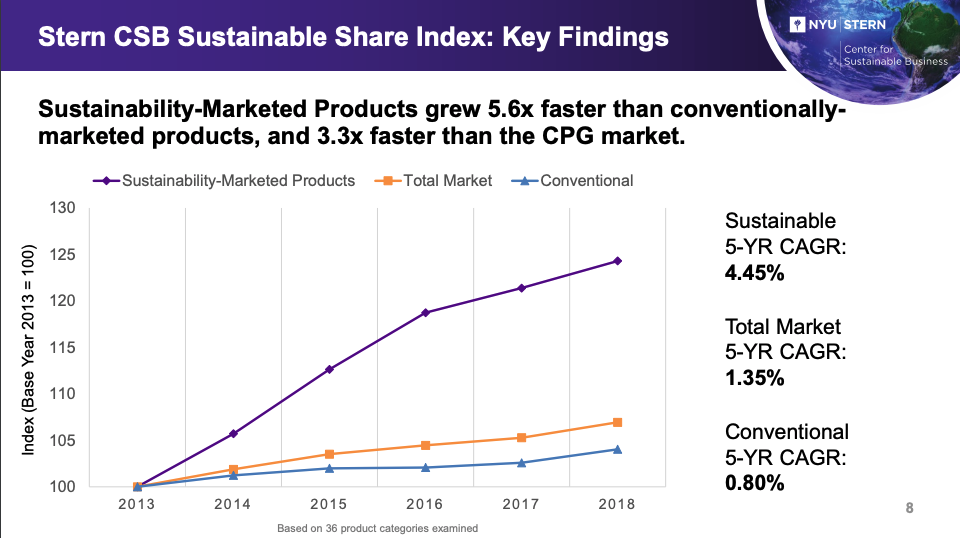
By Tensie Whelan, Director, NYU Stern Center for Sustainable Business
In my work over the years with hundreds of companies, a common refrain I hear is that consumers, for the most part, are not asking for or purchasing sustainable products. The rap is: Consumers may say they want to buy sustainably marketed products, but when it comes down to it, they don’t often do so. So there is a gap between intent to buy sustainably and actual purchase behavior.
Despite this very certain opinion in the CPG sector, no comprehensive study has been done on consumer purchasing of sustainability-marketed products for more than 10 years.
So the NYU Stern Center for Sustainable Business partnered with IRI (a market research and data analytics firm that collects point of sale date), who provided the data pro bono, to understand the actual trends. We reviewed consumer purchasing from 2013 to 2018 of sustainability-marketed products in 36 CPG categories comprising 40% of the total CPG market in dollars and built a Stern Center for Sustainable Business Sustainable Share Index.
We found that products marketed as sustainable are driving product and category growth; in fact, that they delivered 50.1% of the growth in the packaged goods market growth from 2013-2018!
They also grew 5.6x faster than products not marketed as sustainable (5-yr CAGR) and more than 90% of the categories examined saw sustainability-marketed products outperforming both category and their conventional counterparts.

Across all categories, sustainability-marketed products account for 16.6% ($ share of market), up from 14.3% in 2013. This is definitely still niche, but getting close to that tipping point of 25%, which a University of Pennsylvania study has found is the point when the behavior of the minority begins to change the behavior of the majority.
And 16.6% is not small change: Across all categories, sustainability-marketed products delivered $113.9B in sales in 2018, +29% more than in 2013
The market share of sustainability-marketed products aligns along a continuum based on perceived category functionality or efficacy. In other words, sustainability-marketed laundry detergent had lower shares than dairy products such as milk and yogurt. However, even in categories with low shares, shares have been increasing.
We assessed sustainability claims in each category, looking for third-party certifications or clear claims such as GMO-free. We looked at more than 73,000 SKUs to determine which made claims and which qualified. In most categories, we did not include “natural” as a sustainability claim as it was not clear that consumers would see it as sustainable. We were conservative in our assessments. The methodology is available on request.
I also should note that we did not make any attempt to determine if products marketed as sustainable were indeed sustainable as that was outside our scope.
We plan more research with this data as there are some many interesting questions to ask and answer. For example: Are there demographic and/or psychographic differences in purchasing behavior? Are there geographical differences in purchasing? Does price affect the purchase behavior? Are there differences between price brands and premium brands? Are there differences among retail outlets?
So stay tuned for our next report and in the meantime, I would suggest that you explore how to grow your own sustainability—marketed offerings (making sure they are credible, of course) and begin to phase out non-sustainable products that are beginning to show their age in today’s rapidly changing consumer landscape.
____________
 Tensie Whelan joined New York University Stern School of Business in November 2015 as Clinical Professor of Business and Society. She leads the School’s efforts around issues of business and sustainability, driving research and coursework on natural resource-based challenges including climate change, water scarcity, biodiversity loss, poverty and unsustainable development. Professor Whelan also launched Stern’s Center for Sustainable Business, whose mission is to ensure current and future business leaders develop the knowledge and skills to embed sustainability in core business strategy so they can reduce risk; create competitive advantage; develop innovative services, products, and processes; while building value for society and protecting the planet. Professor Whelan was formerly the President of the Rainforest Alliance, where she worked since 2000. In 2014, she was appointed as the School’s 2014-2015 Citi Leadership and Ethics Distinguished Fellow. During her tenure at Rainforest Alliance, she increased the organization’s budget from $4.5 million to $50 million; ensured that 15% of the world’s tea, 14% of the world’s cocoa and 5% of the world’s coffee was certified by the Rainforest Alliance; and increased the visibility of the Rainforest Alliance seal from zero to nearly 45%. Under her leadership, the organization recruited 4,000 companies and nearly 5 million producers and their families in more than 60 countries. Professor Whelan has been working in the environmental field for more than 25 years. Her published works include one of the first books on ecofriendly tourism, Nature Tourism: Managing for the Environment. She has been recognized as one of the “100 Most Influential People in Business Ethics” by Ethisphere and was awarded the James Beard Foundation Leadership Award in 2012. She serves on the advisory boards of Nespresso Innovation Fund, Arabesque, Inherent Group, Corporate Eco Forum, Odebrecht Global Advisory Council, GoodWell, and sits on the board of Globescan.
Tensie Whelan joined New York University Stern School of Business in November 2015 as Clinical Professor of Business and Society. She leads the School’s efforts around issues of business and sustainability, driving research and coursework on natural resource-based challenges including climate change, water scarcity, biodiversity loss, poverty and unsustainable development. Professor Whelan also launched Stern’s Center for Sustainable Business, whose mission is to ensure current and future business leaders develop the knowledge and skills to embed sustainability in core business strategy so they can reduce risk; create competitive advantage; develop innovative services, products, and processes; while building value for society and protecting the planet. Professor Whelan was formerly the President of the Rainforest Alliance, where she worked since 2000. In 2014, she was appointed as the School’s 2014-2015 Citi Leadership and Ethics Distinguished Fellow. During her tenure at Rainforest Alliance, she increased the organization’s budget from $4.5 million to $50 million; ensured that 15% of the world’s tea, 14% of the world’s cocoa and 5% of the world’s coffee was certified by the Rainforest Alliance; and increased the visibility of the Rainforest Alliance seal from zero to nearly 45%. Under her leadership, the organization recruited 4,000 companies and nearly 5 million producers and their families in more than 60 countries. Professor Whelan has been working in the environmental field for more than 25 years. Her published works include one of the first books on ecofriendly tourism, Nature Tourism: Managing for the Environment. She has been recognized as one of the “100 Most Influential People in Business Ethics” by Ethisphere and was awarded the James Beard Foundation Leadership Award in 2012. She serves on the advisory boards of Nespresso Innovation Fund, Arabesque, Inherent Group, Corporate Eco Forum, Odebrecht Global Advisory Council, GoodWell, and sits on the board of Globescan.
